One of the greatest strengths of Bioware games is their ability to provide their players with character driven stories, which revolve around the individuals within them, rather than basing the events on impersonal forces. This is certainly true of the Mass Effect series and in particular is a strength for the second game in the series, the majority of the plot is in dealing with the backstories of your squadmates and helping them achieve closure. Amongst those characters, one has a particularly evocative and colourful past.
I am, of course, speaking of our favourite psychotic biotic: Jack.
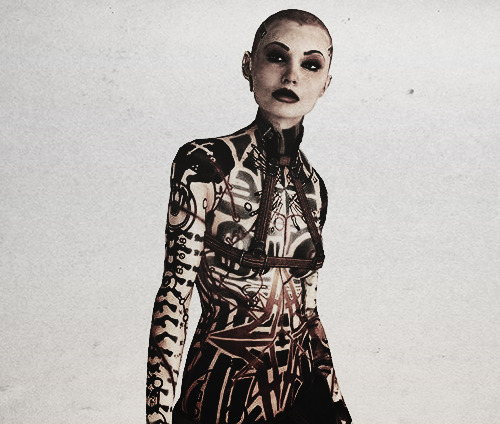 |
| Image posted by Renegons |
Subject Zero
I think it to be of vital importance that, in discussing the character of Jack, one should be aware that her story deals with some exceedingly important issues, and that none of them can be considered to be anything but 'heavy'. Whilst she is the product of speculative fiction, which allows its composure to present extreme cases and 'undiluted' concepts (that is, ideas which are not confounded in their representation by the sheer number of factors which might do so in real life), the issues she is dealing with parallel those situations being endured and encountered by a huge number of people (most of which are women).
Centrally, Jack's narrative is one of abuse. As a child, she was raised in a human colony until Cerberus (an organisation who considers their MO to be allowing humanity to flourish into the best they can be) spotted that she was showing the signs of becoming a particularly potent biotic (an individual capable of producing mass effect fields through conscious control of their nervous system, in conjunction with several small nodes of element zero which are placed into the individual's body). She was then taken to a facility on Pragia. Thus begins the trauma.
The Pragia facility used human children as test subjects, the intention being to push human biotics beyond their current limits. From the first, the researchers noted Jack's potential and she was made the pride of the facility, with treatments first being given to the other children (all of whom were considered expendable) before being tried on Jack. In spite of their want to protect her, she was submitted to isolation as well as physical and psychological torture, all of which was thought to augment her biotic abilities. During her time at the facility, she was known as Subject Zero.
Jack eventually managed to escape the facility, though, unfortunately, this was not the end of her abuse. She was found after her escape, raped (or so it is hinted) and then sold into slavery. Ultimately, this leads her into a life of space piracy, with her having committed almost every violent crime you can think of (besides rape), certainly including arson, murder and torture. Eventually, she is caught and detained in a Blue Suns prison, where she is sold to Commander Shepherd and joins their crew.
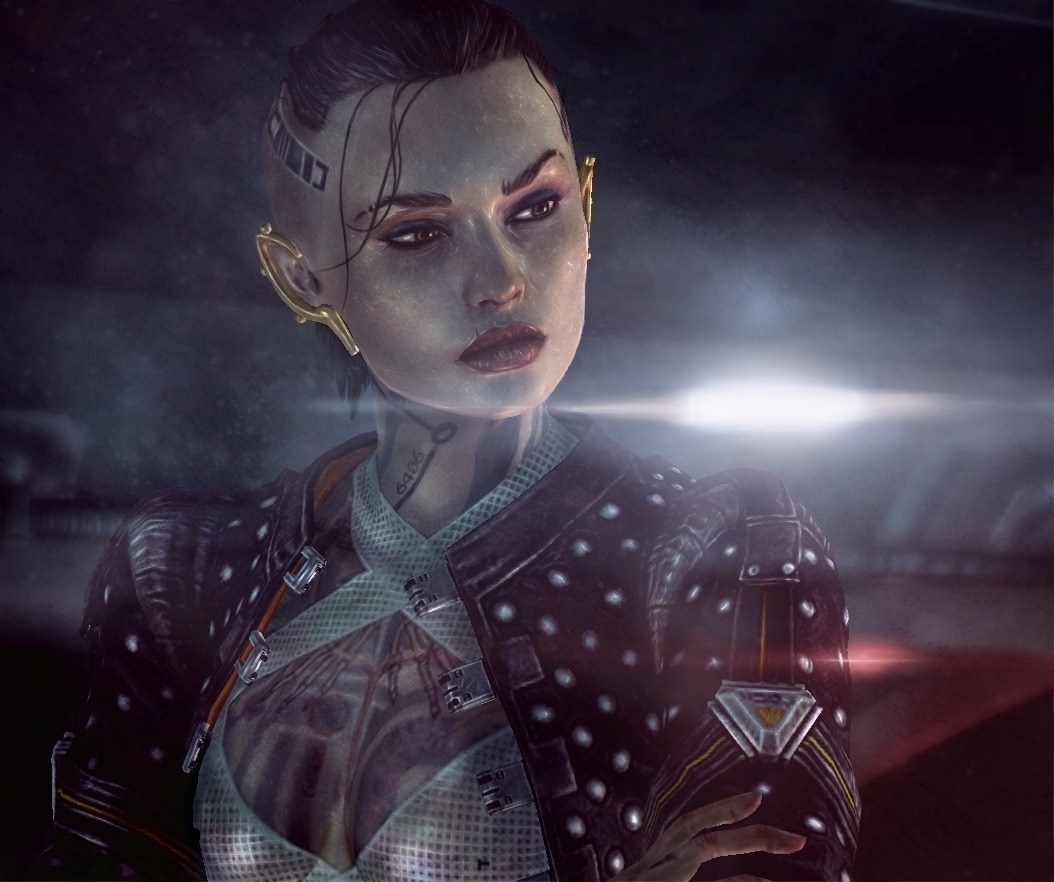 |
| Image posted by The Mad Prince of Puzzles |
Isolation and Objectification: A Living Weapon
During her time in the Pragia facility, Jack was kept alone at almost all times. She grew up believing that the Cerberus facility was the entire world, knowing nothing else beyond it, for her memories of the colony are exceptionally faint, if they at all remain. Kept in a small cell, she was able to see those outside it, the other children, interacting with one another and she would scream at them for hours, trying to attract their attention. Of course, this in itself was another kind of psychological torture, for the cell was designed so that one inside could look out of it, whilst nobody could see into it. Through making it appear as if she were being ignored, Cerberus ultimately conditioned Jack to disregard any attempts at verbal communication with others, as any attempt she made to reach out to those she could see, so close to the other side of her window, were paid no heed. Thus, she was conditioned to know that she was always alone.
The intention of this was likely to force her to be self-reliant which, to a degree, has been achieved. However, a terrible side effect of this is that Jack is unable to trust others or form meaningful relationships. Even after her time at the facility, she was used and abused by those who could have become her saviours. All of this lead her into a world of criminals, into a social world in which no individual is respected, in which everybody uses everyone else. Everything she has ever known has told her that she must be willing to use others to her own advantage if she wants to survive, She is egotistical as a mechanism of survival.
There was only one set of conditions under which Jack was able to interact with the other children at the facility: arena-like combat in which she would be forced to demonstrate the dominance of her biotic abilities by defeating and killing the other children. This was not only done to test her abilities, but also as another kind of conditioning, encouraging her to develop a love of killing. Considering her violent attitude, disregard for the majority of life as well as her reports that killing induces within her a feeling elation, Cerberus were ultimately successful. Violence becomes a way of expressing herself. Thus, Jack is a conditioned killer, a human weapon.
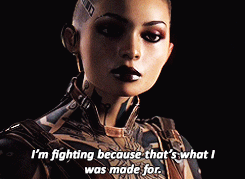 |
| Image posted by Oerbayun |
Furthermore, had she interacted with the other children outside of this arena, they would have treated her with hatred. Not only was she killing them in the arena for sport, but many of the other children were being slaughtered in experiments which were ultimately for Jack's "benefit". However, Jack, in her egoism (though we cannot blame her for it) is unable to see the suffering of the other children, more willing to believe that they hated her for being better and stronger than she, rather than being able to understand what was being inflicted on them in order to, in a twisted way, protect her, in her capacity as an asset of Cerberus.
This ultimately works, leading Jack to believe that she managed to escape the facility alone, only realising upon her return years later that things were not quite so simple. Cerberus security was weakened the night that Jack escaped, for the other children had rioted, thus distracting her guards. In the confusion, she believed that children, those she had been conditioned to kill, had turned against her and thus she slaughtered everybody in her attempt at escape. Whilst predominantly self-sufficient, Jack, like anyone else, requires other people, she is unable to endure everything alone.
Jack is objectified in every single way an individual can be objectified. She is meant to become a perfect weapon, a literal tool for the use of others. She is raped, turned into a object to satisfy the pleasures and desires of those who rape her. Though the psychological damage caused by rape are not to be understated, the conditioning applied to her, involving psychological torture, causes damage beyond that caused by the element of rape alone (which, of course, is more than enough to deal profound emotional, physical and psychological damage).
The result is an individual, someone who considers herself as ultimately alone, ultimately separated from everybody else. She has had all of her autonomy taken from her, her ability to self-define has been almost entirely crushed, with the only things which she has been able to have any control over is her revenge (though this is of course debatable, for much of it is determined by that which has been done to her) and the name she has taken for herself: Jack.
Interestingly, the player can become part of this objectification by choosing to have casual sex with her (which is consensual, you do not force yourself on her). However, choosing to do results in Jack locking you out, preventing you from getting to know her. You turn her into an object, and for the remainder of the game, she acts like it, closing herself off, keeping apart. It is only through seeing her as a person and not as something for Shepherd to use for sexual pleasure, that Jack can be truly known, truly acknowledged. Of course, there is the option to pursue a romance with her, but even if the player chooses to simply be friends, they provide a great help to Jack. Importantly, they do not save her, for she has to save herself. They do, however give her the encouragement she needs.
Interestingly, the player can become part of this objectification by choosing to have casual sex with her (which is consensual, you do not force yourself on her). However, choosing to do results in Jack locking you out, preventing you from getting to know her. You turn her into an object, and for the remainder of the game, she acts like it, closing herself off, keeping apart. It is only through seeing her as a person and not as something for Shepherd to use for sexual pleasure, that Jack can be truly known, truly acknowledged. Of course, there is the option to pursue a romance with her, but even if the player chooses to simply be friends, they provide a great help to Jack. Importantly, they do not save her, for she has to save herself. They do, however give her the encouragement she needs.
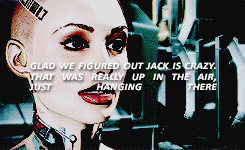 |
| Image posted by The Illusive Woman |
By the time Shepherd first meets her during the second game, Jack has suffered through almost everything a human being can suffer. In spite of being created as a powerful biotic, she is unable to prevent others from taking advantage of her. By the time she arrives at the Blue Suns prison, she has been terrible mistreated and this continues during her time there. Of course, she lashes our and claims revenge through killing those who mistreat her (violence being the only way she knows how), but she ultimately fails. Shepherd finds her trapped in cryogenic stasis. She is literally frozen, locked out of the world.
The True Renegade
We can see some interesting parallels and contrasts between the stories of Miranda and Jack, two characters who are considered, by the narrative itself as well as many players of the game, to be opposites to one another, with Miranda representing authority and Jack representing anarchy.
Cerberus created Jack, they are her eternal foe, having taken everything from her. Even though they have made her biotics so much stronger, they reduce her ability to define as anything beyond a weapon. For Miranda, Cerberus have empowered her, given her a means of sustaining herself outside of her father's influence. The result is opposition: hatred and love for the same organisation.
Furthermore, both Miranda and Jack's stories have an element of manipulation, produced from what we can term actively transhuman philosophies. Miranda was created through enhanced gene therapies and such, the intention of her father being to create a superior, "perfect" heiress. Whilst Miranda struggles with this, mainly due to the weight of expectation placed on her, the "enhancements" applied to Jack are a far more potent and dark source of hardship. Miranda was designed, created, planned before she was born. Jack was abducted, experimented upon and made in a very different way: she was taken, already a living human being, and effectively melted down and reforged.
Cerberus created Jack, they are her eternal foe, having taken everything from her. Even though they have made her biotics so much stronger, they reduce her ability to define as anything beyond a weapon. For Miranda, Cerberus have empowered her, given her a means of sustaining herself outside of her father's influence. The result is opposition: hatred and love for the same organisation.
Furthermore, both Miranda and Jack's stories have an element of manipulation, produced from what we can term actively transhuman philosophies. Miranda was created through enhanced gene therapies and such, the intention of her father being to create a superior, "perfect" heiress. Whilst Miranda struggles with this, mainly due to the weight of expectation placed on her, the "enhancements" applied to Jack are a far more potent and dark source of hardship. Miranda was designed, created, planned before she was born. Jack was abducted, experimented upon and made in a very different way: she was taken, already a living human being, and effectively melted down and reforged.
It is certainly true that Jack can be defined in opposition to authority. In having lived most of her life, especially the integral, formative portion, without the ability to define herself, without any kind of liberty, Jack has developed this oppositional attitude in which she feels as if she needs to always assert her independence, resisting all forms of influence from others. All authority structures she encounters, including the laws of Council space, remind her of a time when she was held entirely within another's power and acts as a kind of trigger, calling her experiences towards the surface of her mind and with it the confrontational attitude, from which she has drawn the strength to create walls against her abuse.
Jack's appearance, including the shaven head and skin covered in tattoos etc. is modeled to reflect styles adopted by many subcultures, which by their very nature as subcultures exist to rebel against certain norms and trends within mainstream culture. She fights her objectification through the transformation of her body into a canvas. She is one of the few game characters who is able to walk around almost entirely topless and yet not be sexualised. Further adding to her rebelliousness, her opposition to any kind of restriction, the very concept enough to remind her of her trauma.
I think it important to note that Jack's understanding of the world (centrally her opposition to authority) is more than simply tainted by her experiences with Cerberus, it is instead completely defined by it. She has never had the chance to experience the galaxy, and the diversity within it, in a context which exists outside of her abuse. She has no stable memory of anything before Pragia, grew up believing the facility was the entire world, she has never been able to experience things with the required degree of neutrality in order to form anything resembling a complex or comprehensive understanding of the subtle ways in which things work. Jack is more animalistic in her understanding, violence and exploitation, the only things she has ever known, are ultimately what define interaction for her.
There is, however, an indication that Jack does seek some kind of deeper understanding, for she joins a cult with the intention of embracing their dogma and providing her life with some structure. This willingness to accept that there might be something more to the world than the simplistic, violent understanding she possesses shows that, in spite of its hold on her, Jack is able to begin dealing with her abuse. However, for reasons unknown, she flees the cult, though she keeps her head shaven.
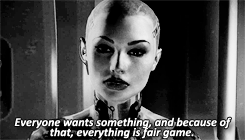 |
| Image posted by Aarnpaul |
Jack's appearance, including the shaven head and skin covered in tattoos etc. is modeled to reflect styles adopted by many subcultures, which by their very nature as subcultures exist to rebel against certain norms and trends within mainstream culture. She fights her objectification through the transformation of her body into a canvas. She is one of the few game characters who is able to walk around almost entirely topless and yet not be sexualised. Further adding to her rebelliousness, her opposition to any kind of restriction, the very concept enough to remind her of her trauma.
I think it important to note that Jack's understanding of the world (centrally her opposition to authority) is more than simply tainted by her experiences with Cerberus, it is instead completely defined by it. She has never had the chance to experience the galaxy, and the diversity within it, in a context which exists outside of her abuse. She has no stable memory of anything before Pragia, grew up believing the facility was the entire world, she has never been able to experience things with the required degree of neutrality in order to form anything resembling a complex or comprehensive understanding of the subtle ways in which things work. Jack is more animalistic in her understanding, violence and exploitation, the only things she has ever known, are ultimately what define interaction for her.
There is, however, an indication that Jack does seek some kind of deeper understanding, for she joins a cult with the intention of embracing their dogma and providing her life with some structure. This willingness to accept that there might be something more to the world than the simplistic, violent understanding she possesses shows that, in spite of its hold on her, Jack is able to begin dealing with her abuse. However, for reasons unknown, she flees the cult, though she keeps her head shaven.
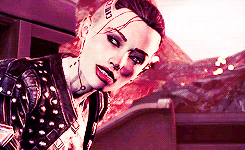 |
| Image posted by Gamers Daily |
Onwards
In attempting to push the boundaries of human biotics, Cerberus, as is, apparently, in accordance with the typical outcome of their work, have ended up creating an exceptional weapon: a human with exceptional biotic strength. However, in doing so, they have ripped out many integral parts of Jack's humanity, more specifically her capacity for empathy and emotions beyond that of rage and other forms of anger. They critically wound her ability to relate to others, leaving her isolated and lonely.
Whilst it is easy to summarise Jack's story as an abuse or rape narrative, both of which hold some truth to them, I think it important to note how the two concepts have been handled within the narrative so applaudably. All of these abusive events are spoken of in the game itself, though Jack does not reveal them openly and does not talk about them at length, they are shown to have affected her very deeply. The fact that have had so deep an effect on her, and that they drive her narrative, rather than that of another character indicates that the use of rape within the narrative is not done to add "tone" to the game or to make it edgy or gritty. The effects and impact of these traumas are explored (though the depth is limited, as one would expect from a game which is not entirely focused around these topics).
Jack, should she be given the chance, is able to built something for herself, is able to become a tutor, to protect her students and nurture them in her own way. This outcome is exceptionally pleasing, for it is not the tragic ending which victims of abuse are so often given and it is furthermore not miraculous. Jack's trauma and its effects are not magically washed away, making everything okay and dismissing the true impact of her suffering, but it is shown as being something that she is strong enough to deal with, to keep moving in spite of. Jack is a victim, and this is important, but she is so much more than this.
Additionally, though she is shown as developing beyond her lust for violence, she does so in such a way as to allow her to retain her oppositional attitude, allowing her to change without surrendering who she fundamentally is. Jack is a subversive, she exists to set others on edge. But this does not prevent her from being an exceptionally warm and affectionate character, provided you do not allow yourself to, perhaps without at first realising it, becoming a part of her cycle of suffering.
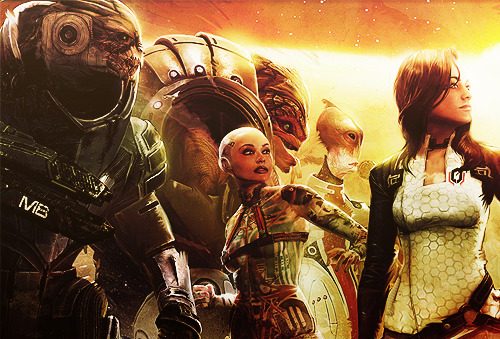 |
| Image posted by Dwarf Princess |
No comments:
Post a Comment